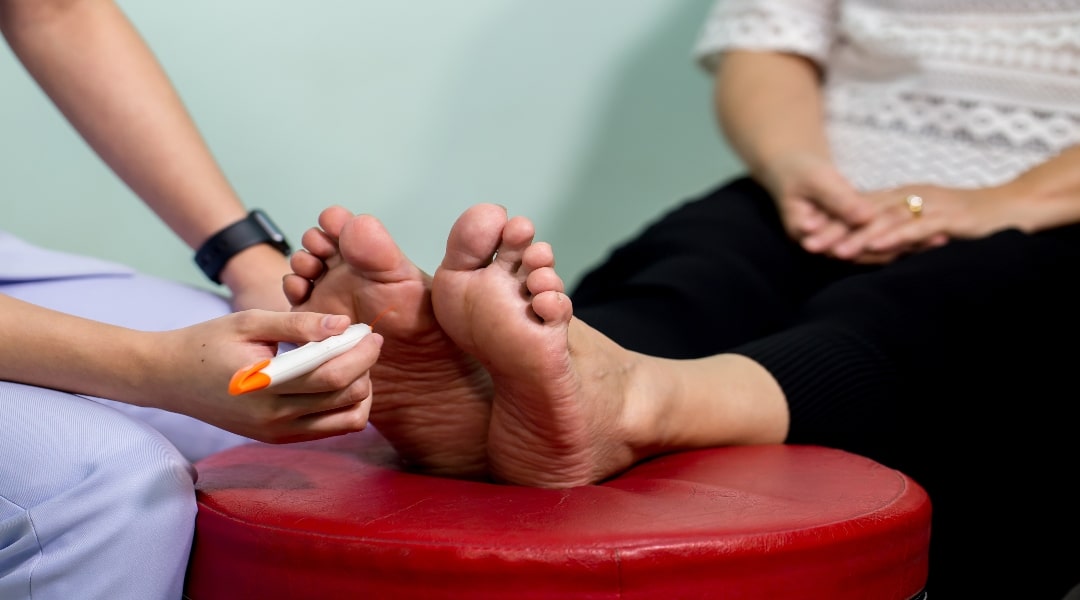4 Tips for Diabetic Foot Care
While an important part of anyone’s body, the wellbeing of one’s feet is of particular significance when diagnosed with diabetes. With the nerve damage threatened by diabetes on the body, the feet are a particular pain point for many with the condition.
Whether it’s mild damage or neuropathy, there is a range of ways that diabetics can properly care for their feet and overall health.
Importance Of Proper Foot Care for Diabetic Patients
Diabetes can cause several symptoms throughout the body but is most prominently known for its ability to cause nerve degeneration and related damage.
Peripheral neuropathy is one of many possible causes of foot-related problems in diabetics. The condition is caused by abnormally low blood sugar and often results in pain, numbness, and muscle weakness throughout the body. In the feet, the condition causes a loss of sensation and an inability to properly detect temperature. This lack of sense in the foot can lead to many problems with serious consequences if left untreated, including ulcers, infections, and wounds that can become infected.
Due to their greater risk of developing problems in the feet, it is essential that those with diabetes effectively understand the importance and necessity of managing and caring for them properly.
The following are just some practices you can take to maintain the health of your feet while managing diabetes.

Inspect Your Feet Regularly
As nerve damage can sometimes give diabetics a false impression of the inflictions on their feet, visually checking them regularly can help prevent any issues from developing. Inspecting for things like cracks and sores can go a long way in detecting potential problems early and curtailing their progression.
Infections and wounds that are not immediately detected can become serious problems for those with diabetes. As a result, thoroughly inspecting the feet at least weekly is recommended.
Keep Your Feet Dry
Having damp feet for prolonged periods can cause them to become a prime breeding ground for bacteria, as well as fungus and other microorganisms. Keeping the feet as dry as possible can go a long way in preventing problems like athlete’s foot, warts, and blisters. For those with diabetes that are especially vulnerable to foot-related issues, it is best to dry the feet after washing or showering, as well as any other time they become wet.
Use Diabetes-Friendly Footwear
The overall shape and structure of footwear can have a significant impact on the development of diabetic foot-related problems. The use of shoes that fit properly and provide adequate support to the feet can go a long way in countering any potential damage as well as reducing pain and discomfort. Those with diabetes must wear shoes that offer cushioning, breathability and stability.
Socks that are designed to properly absorb sweat and reduce the risk of infection can also be beneficial in preventing foot issues and protecting against potential damage.
Don’t Go Barefoot
Going barefoot for extended periods can cause damage to the feet and lead to serious problems including infection and inflammation. For those with limited feeling in the feet, these problems become excessively risky for their potential to easily go unnoticed. Using shoes inside and outside the home is recommended to ensure that the feet are protected from inflictions as much as possible and that any potential issues from such exposures are averted.

When To See a Doctor
While foot care done at home can be extremely beneficial in the prevention and mitigation of diabetes-related foot problems, some cases will warrant a professional’s assessment or treatment. In severe conditions involving changes in sensation, pain, color, or other issues in the feet, seeking medical attention as soon as possible can help protect against more serious symptoms and reduce the risk of further worsening.
Diabetic patients should never hesitate in contacting their doctor or other health care provider for necessary assessment and treatment options when they notice changes in their foot health. In addition to inspecting the feet, a medical professional can provide advice on how to properly disinfect and/or treat open wounds or sores.
Several foot-related conditions can develop quickly and require immediate treatment if they are to be successfully managed, so being prudent and proactive in this regard is essential.
Due to the significant amount of problems that can develop in the feet because of diabetes, those with the condition must have them properly cared for. Preventing foot-related issues from developing should always be prioritized over-treating them once they do arise. By taking proper care of diabetic feet at home through regular inspection, keeping them as dry as possible, and wearing appropriate footwear, those with diabetes can significantly reduce their risk of serious damage to their feet.
We will do everything we can to help you heal quickly, completely, and get back to doing what you love! Just call (620) 241-3313, or request an appointment online.
© Community Foot Clinic of McPherson. All Rights Reserved.
Privacy Policy | Terms & Conditions
Web Design by CP Solutions
Marketed by VMD Services
